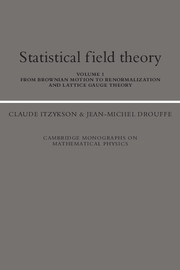Book contents
Preface
Published online by Cambridge University Press: 05 August 2012
Summary
Some ten years ago, when completing with J.-B. Zuber a previous text on Quantum Field Theory, the senior author was painfully aware that little mention was made that methods in statistical physics and Euclidean field theory were coming closer and closer, with common tools based on the use of path integrals and the renormalization group giving insights on global structures. It was partly to fill this gap that the present book was undertaken. Alas, over the five years that it took to come to life, both subjects have undergone a new evolution. Disordered media, growth patterns, complex dynamical systems or spin glasses are among the new important topics in statistical mechanics, while superstring theory has turned to the study of extended systems, Kaluza–Klein theories in higher dimensions, anticommuting coordinates … in an attempt to formulate a unified model including all known interactions. New and sophisticated techniques have invaded statistical physics, ranging from algebraic methods in integrable systems to fractal sets or random surfaces. Powerful computers or special devices provide “experimental” means for a new brand of theoretical physicists. In quantum field theory, applications of differential topology, geometry, Riemannian manifolds, operator theory … require a deeper background in mathematics and a knowledge of some of its most recent developments. As a result, when surveying what has been included in the present volume in an attempt to uncover the basic unity of these subjects, the authors have the same unsatisfactory feeling of not being able to bring the reader really up to date.
- Type
- Chapter
- Information
- Statistical Field Theory , pp. xi - xviPublisher: Cambridge University PressPrint publication year: 1989
- 3
- Cited by

